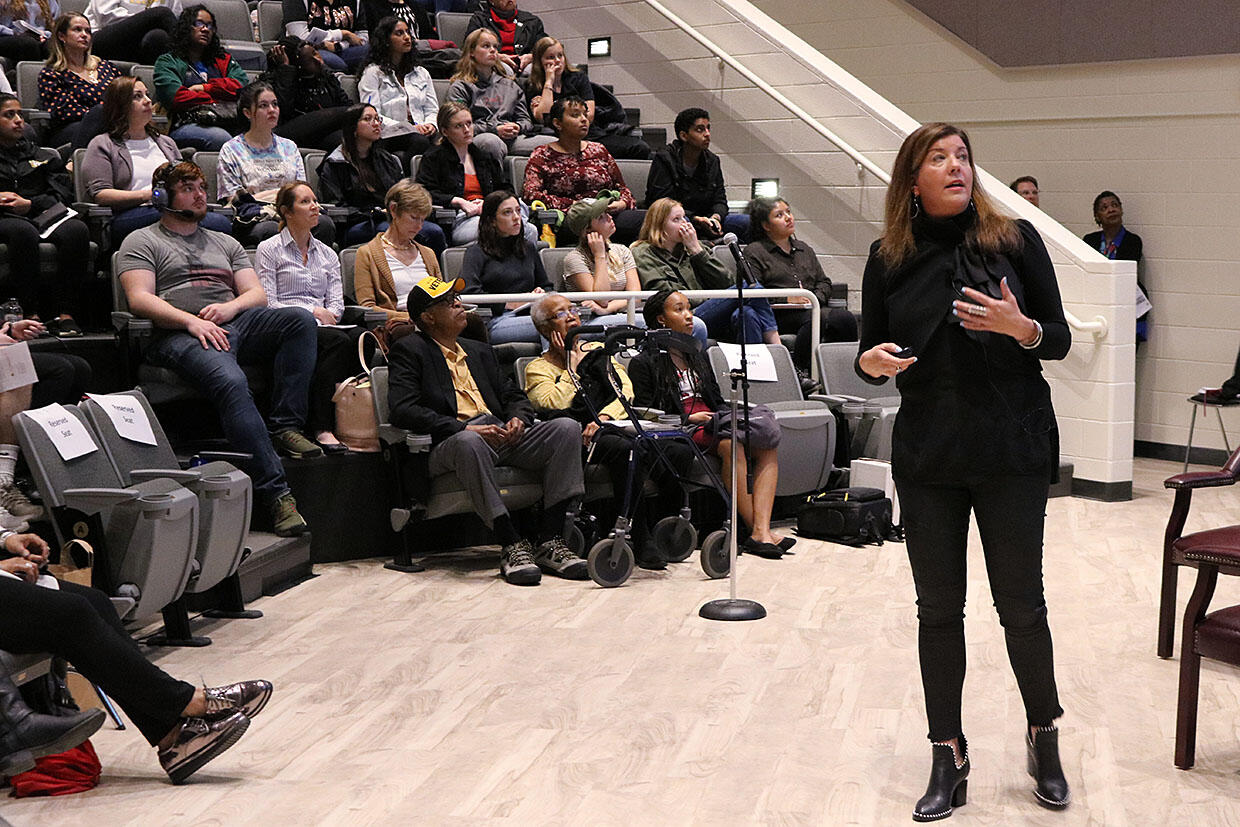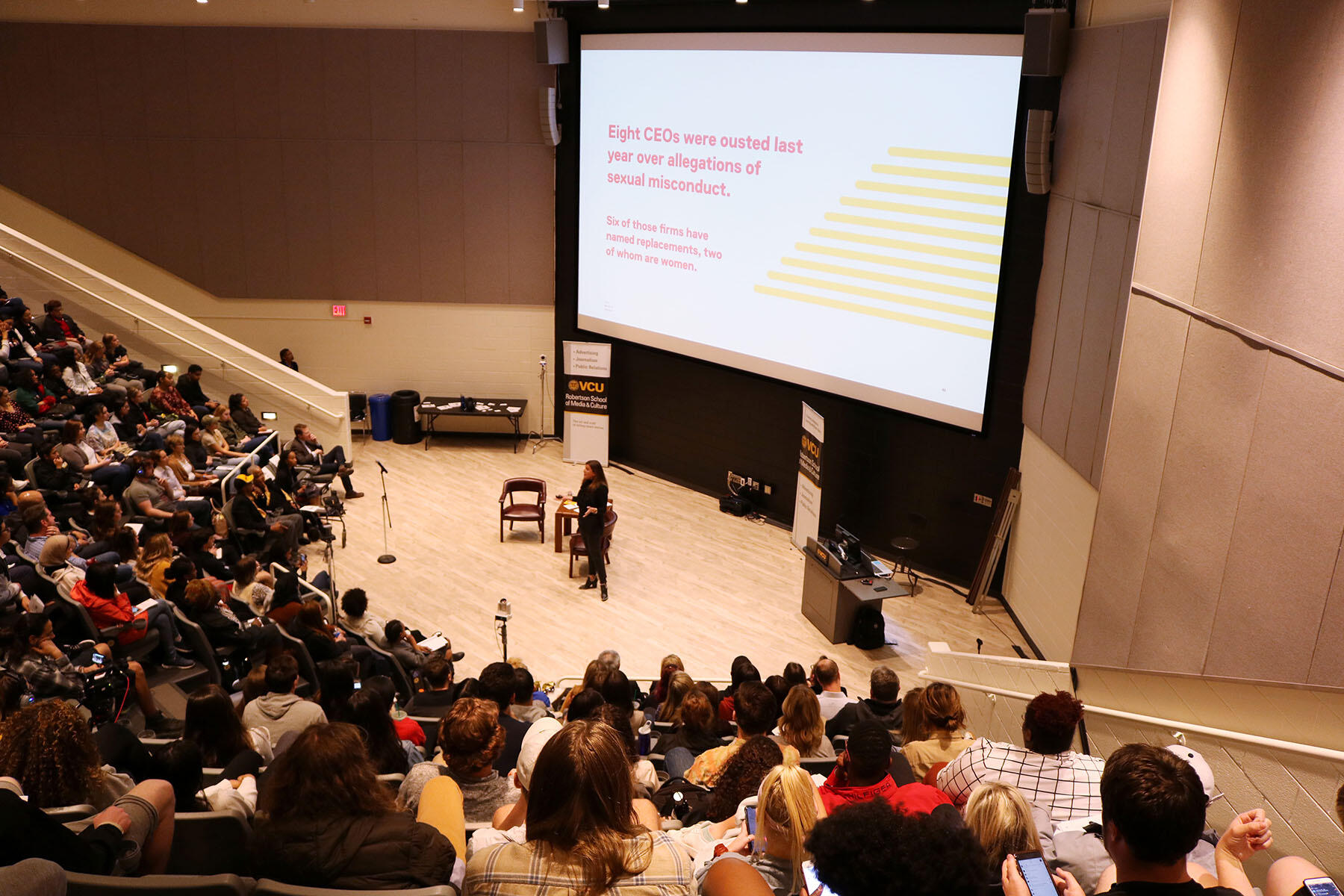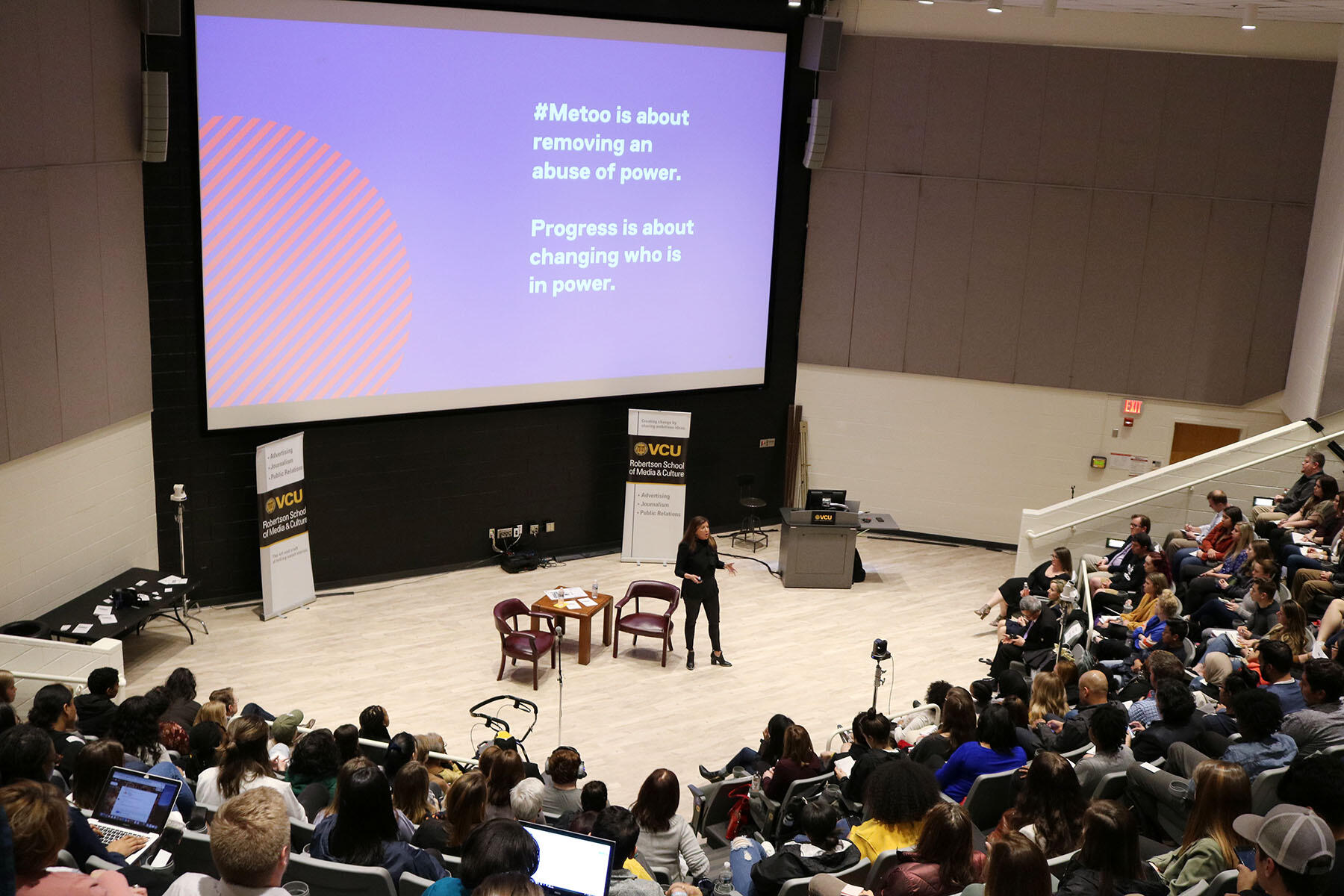
March 26, 2019
How The Martin Agency went from a #MeToo crisis to becoming a ‘light in the dark’
Share this story
“You’re intimidating.” “We need boobs in the room.” “Talk less, listen more.” “Try not to make people feel uncomfortable.” “You’re too far out front.” “You need to make dinner for your kids.” “Your expectations are too high.” “Maybe if you slept with the client, we’d win.”
Kristen Cavallo heard all these comments in her professional and personal life leading up to being named CEO of The Martin Agency, the iconic Richmond-based advertising firm behind the GEICO cavemen, the GEICO gecko and “Virginia is for Lovers,” along with clients such as Oreo, Purina and Discover.
“Ironically, even though I’m saying these things now, somebody asked me once, when I first took the job, if I’d ever been a victim of sexual harassment and my answer was no,” Cavallo said. “And it’s funny now when I see these [statements], because I’m like, wow, I guess that qualified. But I think there was a sense that maybe it was normal or maybe it was expected or because I didn’t feel victimized. I just didn’t think of it as being a victim.”
Cavallo, who was hired as CEO in late 2017 following an internal investigation into an allegation of sexual harassment by the company’s previous chief creative officer, spoke Monday at Virginia Commonwealth University on “Female Leadership in the Age of #MeToo.” Her talk was part of an ongoing speaker series organized by the Richard T. Robertson School of Media and Culture in the College of Humanities and Sciences.
Cavallo called herself a “reluctant CEO.” She never aspired to be a CEO. She’d never even interviewed before becoming one.
“It was never something that I wanted to be, not because I was afraid but because I thought I’d be locked in. I’m an Army brat. I’ve moved a lot my whole life and I’ve always valued freedom more than power. And when I thought of my career, I thought of a chess board and I thought the king only can move one square in any direction but the queen can go any direction, as many squares as she wants,” she said. “My aspiration was to be the Sheryl Sandberg to somebody else’s Mark Zuckerberg.”

The reluctant CEO
Cavallo said she was hired because she was a woman who worked for The Martin Agency’s parent company, the Interpublic Group, most recently as U.S. chief strategy officer and growth officer at MullenLowe. She lived in Richmond, and she had the added benefit of having previously worked at The Martin Agency.
“I was the fastest way to change a narrative. And they needed something fast. I don’t fault them for that. I think it was a very smart move on their part,” she said.
Cavallo knew she could get results. She cared deeply about The Martin Agency, and she knew who the power players were — valuable information as the company navigated the crisis.
“You know if you’re pitching Apple and they give you one week to solve a huge problem, you know the eight people you get in a room. So I knew who those people were, but I’d also spent valuable years away where I learned how to do things differently,” she said. “And so I thought I was the best candidate for the job. I also cared enormously about the agency. And I thought if it’s going to turn, I am the right person to turn it.”
Yet the decision wasn’t easy. She had to ask herself: Was she reluctant to be a CEO because it was something she didn’t want to do? Or was it because she wasn’t confident enough in herself?
“I had to really interrogate myself on that,” she said. “Because the truth is, there’s something called the confidence gap. Evidence shows that women are less self-assured than men in the business world, and that to succeed, confidence matters as much as competence.”
Plus, the crisis facing The Martin Agency was daunting. When she took the job, the company had 700 million negative media impressions.
The first thing she did was appoint a female chief creative officer, Karen Costello.
“I didn’t appoint her because she was female. I did appoint because I thought she was the best person for the job,” she said. “Like me, she was relatively new. She had been at Martin for about six months, so I knew she came with a lot of ideas, that she knew how to do things [at] other places. But more importantly, I picked her because we had the same values.”
Cavallo and Costello agreed that having good intentions would not be enough.
“We made a list of all the things that bothered us as we were growing up in agencies, and we thought, ‘Oh, my God, can we change these things?’ We sat and we literally asked ourselves, ‘Can we change?’ And we realized, it was a silly thing, but we literally had this moment when it dawned on us that there was nobody to say no. We’re the people in charge,” Cavallo said.
I didn’t appoint her because she was female. I did appoint because I thought she was the best person for the job. … more importantly, I picked her because we had the same values.
‘We can totally do this’
Cavallo and Costello first set out to double the number of women in the firm’s leadership.
“We have a female CEO, a female chief creative officer, a female CFO. I think we might be the only general ad agency in the country that can say that,” Cavallo said. “And then a female chief culture officer … and that was just the beginning.”
They next took on gender disparities in pay.
“We thought, ‘Oh, my God, could we eliminate the wage gap?’ We’re like, ‘Oh, we can do this. We can totally do this,’” she said. “So we did it and it took us two weeks.”
They pledged to “free the bid,” in which female directors are given an opportunity to bid for projects. The pledge is part of an industrywide push for ad agencies and content producers to include at least one bid from a woman on every commercial they produce.
“For a long time there was a sense that female directors couldn’t do humor. You give female directors stories, narratives, things that make you cry. You don’t give women humor. So we said, ‘Yeah we’re going to change that,’” she said. “We have women now bidding on every single project … The first project we did coming out of this was GEICO. And we had a woman shoot six spots for [it] last year.”
As the team implemented reform after reform, they found themselves coining the phrase, “And so we did.”
“We started saying it over and over and over. Every time we achieve something: ‘And so we did.’ Can we do this? Yep. And so we did. And so we did. And so we did,” she said.
The Martin Agency, she said, was going to be the agency defined by its progress and not #MeToo.
The agency “blew up” its HR department. It appointed a chief culture officer. It brought in a person from politics to add new ways of thinking.
“We burnt bridges just so we wouldn’t go back,” Cavallo said. “Crisis research tells you that when things settle and the dust calms, what most people do is they go back to pre-crisis behavior.”
The company also implemented reforms to ensure more diversity in hiring pools. As a result, this year 40 percent of the people The Martin Agency is hiring are from diverse populations.
“That would not have happened if we were not intentional about it. We absolutely got intentional and we absolutely got specific and we absolutely got purposeful and we are a better company because of it,” she said. “We are a more interesting company. The work coming out of our company is better and richer and more interesting and so it’s probably the thing I’m most proud of, of all the things we’ve achieved.”

A light in the dark
All of these reforms, Cavallo said, will only matter if The Martin Agency is successful.
“The truth is, I will be taken out if I don’t turn the company around,” she said. “I got the job because I was a way to change the narrative. But if I can’t turn the company, if we can’t turn the company, it doesn’t matter.”
The company was advised by public relations professionals to lay low in the wake of the scandal to let it die down, then bounce back with, say, a great new GEICO ad. However, Cavallo thought a better strategy would be to publicize its progress, letting people know The Martin Agency is moving past previous abuses of power.
“Our strategy was to be the light in the dark,” she said. “So every time there was a story about MeToo, we said we’ll be in it. We went towards the problem and we said we are going to tell a different story every single time there is one. We will be the example of the company that didn’t do what everyone else was doing and that was purposeful.”
The Martin Agency won eight new clients, including Buffalo Wild Wings. It won back UPS globally in a rare case of a client firing an agency and then hiring it back. The Martin Agency was named a top 25 agency. It saw double-digit increases in margin and revenue.
“We did not lose a single piece of business as a result of the change in leadership,” she said. “And the change in leadership was a new CEO, new president, new chief operating officer, new chief creative officer. That’s a lot of leadership to flip. And advertising is based on relationships. So to not lose a single client was, well, that’s the absence of a negative, but I’m telling you, it was worth everything.”
We burnt bridges just so we wouldn’t go back. Crisis research tells you that when things settle and the dust calms, what most people do is they go back to pre-crisis behavior.
‘Put your hat in the ring’
While The Martin Agency has turned things around, Cavallo said, the #MeToo era has not brought about gender equity in the business world. The number of female CEOs has declined, going from 32 women CEOs of Fortune 500 companies to 24.
“There have always been a small number of women leading the big companies. But right now it’s 5 percent,” she said. “At a time when we’re talking about women in leadership more than ever before. So we have to really study that and understand what is happening. Is it a pendulum swinging? Are people feeling like it’s happening anyway, so we don’t need to try so hard? Are people actively working against it? Are we as women not putting our hat in the ring? Are there forces that work against us? The truth is it’s all the above.”
In 2015, she said, there were 87 CEO positions that opened up in North America. Only one went to a woman.
“There are more CEOs named John in the Fortune 500 than all female CEOs combined, just to put it in perspective,” she said.
Part of the reason is that men are more willing to throw their hat in the ring, whereas women — herself included — tend to be more reluctant.
She encouraged the female students in the audience to, “Say yes, go to the top, put your hat in the ring [and] figure it out later.”
Subscribe to VCU News
Subscribe to VCU News at newsletter.vcu.edu and receive a selection of stories, videos, photos, news clips and event listings in your inbox.







